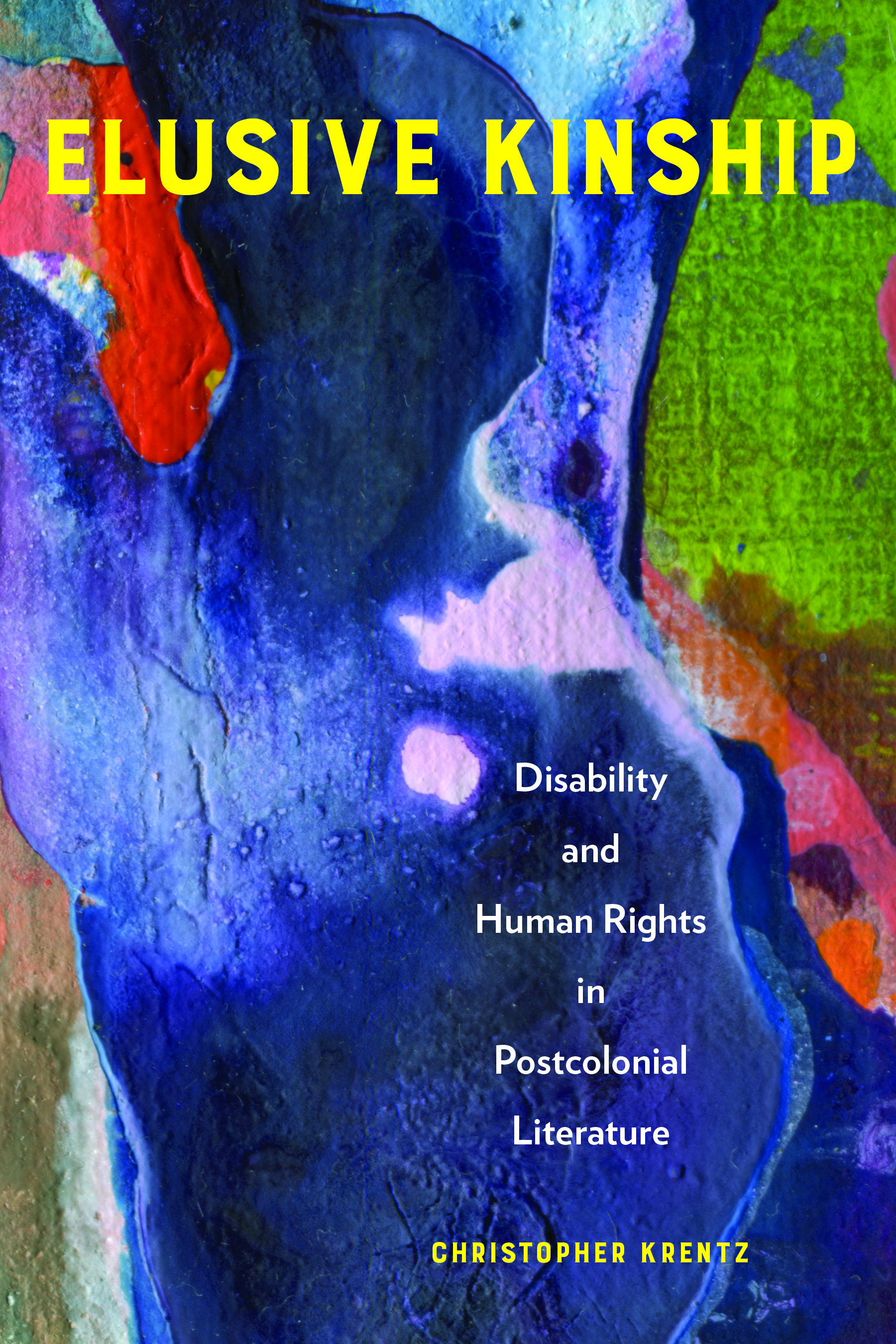Disability and Human Rights in Global Literature

Christopher Krentz is an Associate Professor with a joint appointment between the English Department and the American Sign Language Program in the College and Graduate School of Arts & Sciences at the University of Virginia. Mr. Krentz has just completed his second book, Elusive Kinship, and shares his journey and experience with us.
An albino woman in Zimbabwe is wrongly imprisoned for the murder of a white man in Petina Gappah’s novel The Book of Memory (2017).
A homeless, cognitively disabled man wanders through war-torn South Africa in JM Coetzee’s The Life & Times of Michael K (1983).
In mid-century India, an upper-class mother calls her disabled adult daughter a disgrace for daring to go out to a restaurant in Anita Desai’s Fasting, Feasting (1999).
As these examples suggest, some of the most exciting fiction in English is happening not in the United States or Great Britain, but in other parts of the world. These regions are usually former colonies of Great Britain like India and Nigeria. Literary scholars call their writing collectively “postcolonial literature,” which at its best is rich, vibrant, and relevant to what’s going on in the world now. I spent more than a decade studying postcolonial literature and last year published an academic book on this corpus called Elusive Kinship: Disability and Human Rights in Postcolonial Literature. The topic represents something of a departure for me; here is the story of how I came to write such a book.
As an undergraduate English major at Yale, I did not take a class about postcolonial literature. Neither did I in the doctoral program at the University of Virginia in the 1990s. Then when I started as an assistant professor of English and American Sign Language at UVA, esteemed senior scholars like Michael Levenson and Jahan Ramazani mentioned to me that the field of English literary studies needed to pay more attention to global English. Around the same time, the prominent scholar Ato Quayson (now at Stanford) noted that postcolonial literature contains many figures of disability.
Since I’m late-deafened (I have lost much of my hearing since age nine), I have been especially interested in the literary representation of disabled people. My first book, called Writing Deafness (2007), looks at deafness in nineteenth-century American literature by both deaf and hearing writers like Herman Melville and Mark Twain. It was doubtless inspired by my own desire to learn about myself and my group’s past.
Now, scholars around me were pointing to something intriguing and urgent. I learned that roughly eighty percent of disabled people – more than half a billion people -- live in the Global South, often in vulnerable situations, so disability is not a minor concern. When the United Nations adopted the Convention for the Rights of People with Disabilities (CRPD) in 2006, I began to wonder about the shift in thinking about disabled people globally, from unfortunate recipients of charity or fear to people with human rights. Surprisingly, I could not find much research on disabled characters in this fiction. I started reading and teaching postcolonial literature more often, and discovered this same shift in many stories over the last sixty-five years. Among my findings:
- Chinua Achebe’s classic Things Fall Apart (1958) concerns a beautiful Igbo culture in Nigeria that has dignity but is fixated upon physical strength. It often treats disability as something to be feared and ostracized. The incursion of British colonizers complicates the picture. The colonizers (so clearly evil in other areas) paradoxically treat disability with benevolence, “soft power” that helps open Umuofia to colonization by them.
- Salman Rushdie’s Midnight’s Children (1981) uses disability as a reality and a metaphor for the postcolonial Indian nation. Its whimsical narrator Saleem has a number of disabilities and faces stigmatization and bullying as he grows.
- JM Coetzee also employs disability as both a metaphor and a reality. In The Life & Times of Michael K, for instance, the cognitively disabled Michael can be read as an allegory of the failures of apartheid South Africa and the material realities facing disabled people around the world.
- In Desai’s Fasting, Feasting we can see compassion for the disabled Uma. We encounter similar caring depictions in work by Jhumpa Lahiri and Edwidge Danticat in what could be called a feminist ethic of care.
- Authors also deploy disability to depict injustice. In Chris Abani’s harrowing Song for Night (2007), for instance, a child soldier narrates during the Banfra War in Nigeria in the late 1960s. Because My Luck and other child soldiers in his bomb-defusing platoon have had their vocal cords severed so they cannot talk, they serve as a clear indictment of the many people in wars who are too often voiceless and unheard in Western media.
- Similarly, in Animal’s People (2007), the narrator, who has a bent spine due to an American chemical plant disaster and goes about on all fours, serves as a fictional representation of the injustice that has actually killed and sickened thousands in Bhopal India.
As we can see, in these novels disability is not marginal, but goes to the ethical core of narratives. Authors deploy disability to take on a number of injustices, including the effects of colonization, racism and sexism, war, and environmental disaster. But such representations also relate to the actual experience of disabled people in the Global South, making what is often invisible more prominent.
Elusive Kinship argues that readers often feel a tug of connection to disabled characters, opening the way to greater understanding or even empathy, which can foster action in the real world. Such connection does not always happen – hence the “elusive” in my title – but it sometimes does, suggesting that literature has both reflected and shaped attitudes toward disabled people over the last sixty-five years, leading to our human-rights-based perspective today.
The project came with a steep learning curve for me, which made the work take years but added to the joy in doing it. Mid-way through, I also took a trip to Zimbabwe and Kenya, where I was able to visit schools for disabled students and get a real-world perspective on this topic. I learned a lot, I read and taught some great literary works, and hopefully the book will make a difference.

- UVA Club of Pasadena: Hoo-liday Party
- UVA Club of Middle Tennessee: Hoo-liday Party
- UVA Club of Culpeper: Hoo-liday Party